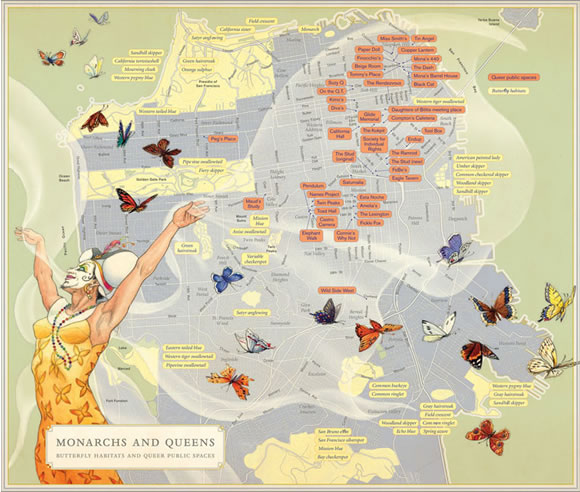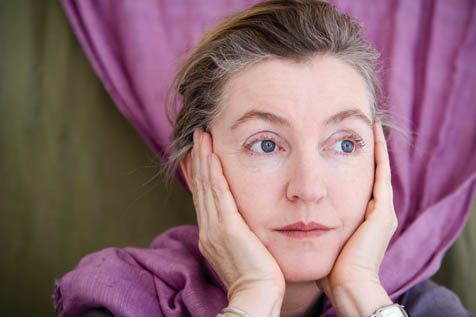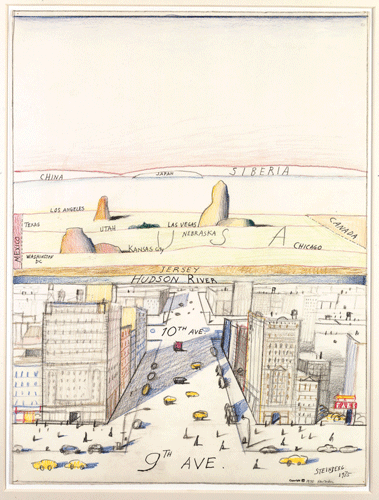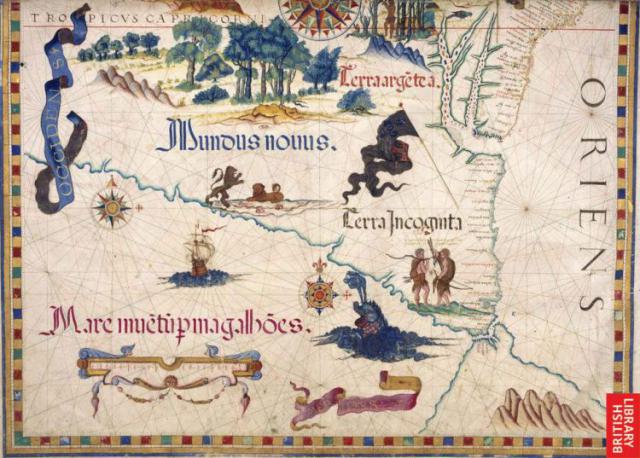Serendip is an independent site partnering with faculty at multiple colleges and universities around the world. Happy exploring!
Towards Day 3 (Wed, Sept. 12): On Getting Lost


Rebecca Solnit's newest book, Infinite City, includes 22 color maps of the San Francisco Bay Area,
each one illuminating the city and its surroundings as experienced by different inhabitants
(this one juxtaposes the habitats of local butterflies with the shifting locations of queer public space....!)
I. coursekeeping
* meeting again in the adirondack chairs in front of English House
* introductions--how are you doing on learning one another's names?
let's ask one another to introduce ourselves
(w/ some eco-detail that will help us remember?)
* checking in re: meeting here/outside
(Wunderground's prediction for Monday @ noon is "74 degrees,
2 mph winds, 0% chance of precipitation, 51% cloud cover)
we'll do so unless it's raining or below...what temp?
a possibility (which my frosh have taken up) is that
you could take turns selecting sites for us to meet...
* you know already that by tomorrow @ 5 you need to
--select an outdoor site on campus (or @ HC, or @ your home in West Philly)
that you will re-visit, once/week, throughout the semester; and also
--post a visualization of the campus (or where you live)--a map, a photograph, a sketch,
and write a paragraph about what (in Solnit's terms) you are choosing to foreground thereby, and why.
You might go on a bit (still following Solnit): What is background in this visualization? Where are its boundaries? What is terra incognita here? But most importantly: explain the relation of that image
to your chosen site.
* by Sunday @ 5, make a second post on Serendip, selecting three keywords we might find of use for
the next stage of our shared exploration (possibilities include--but are by no means limited to-- "place," "nature," "environment," 'home," "housekeeping," "economics," "ecology," "deep ecology," "ecosystem," "ecocentric," "egocentric," "biocentric," "anthropocentric," "speciesism," "growthism," "interrelationship," "interaction," "interdependence," "diversity," "adaptation," "sustainable," "green," "ruderal," "succession," "resilience," "permaculture"....). Go to @ least three dictionaries, including the OED, to uncover a historical range of definitions, meanings, histories, etymologies, and future use values for these words. Share the history of your keywords on-line, and compare what you found with what @ least one of your classmates has discovered (you could make your posting as a "comment" on theirs, or just reference what they've said w/ an active link to their posting....)
* the reading for next Monday's class is Raymond Williams's 1985 essay on "Key Words/Key Concepts," which explains the background of this project (and models it); it's 10-pp. explaining why it's important to understand the etymologies of words....if you need to be convinced of that, or need to see how to do this, read it; if not, spend your time exploring your own words....we won't focus on his work, but rather about what we've discovered ourselves...
* any questions, comments, feedback on course expectations...?
II. For today, I asked you to read two selections from Solnit's Field Guide to Getting Lost...
which argues, among other things, that getting lost is an important part
both of childhood and of growing up...talk about that idea? do you agree?
would Thoreau? what might they say to one another? how does her style compare w/ his?
what might we say back to her? (is there some privilege assumed, in her call to "get lost"...
some assumption that we are stably located?)
what does it mean to "get lost"? how is that different from losing (things)?
Imagine yourself streaming through time shedding gloves, umbrellas, wrenches, books, friends, homes,
names. This is what the view looks like if you take a rear-facing seat on the train. Looking forward you
constantly acquire moments of arrival, moments of realization, moments of discovery ... you are greeted
by what you have never seen before ... the art is ... one of ... letting go. And when everything else is
gone, you can be rich in loss (p. 22-23).
Cf. Elizabeth Bishop's poem, "One Art," which begins,
"The art of losing isn't hard to master....,"
and ends, "Though it looks (write it!) like disaster."
(she's trying to talk herself into this position...)
can/should we turn "getting lost" into an educational program?? provide a "field guide"?
or is that impossible/paradoxical/oxymoronic?
"How do you go about finding those things that are in some ways about
extending the boundaries of the self into unknown territory, about becoming
someone else?.... To calculate on the unforeseen is perhaps exactly the
paradoxical operation that life requires of us .... "To lose oneself ...
requires quite a different schooling" (pp. 5-6).
what do you do, when you are lost? how do you orient yourself?
have you ever tried to follow a map that didn't "work"/fit?

An exercise
1) map your life onto a blank world map, with dates:
year you were born (and where); where you are now (and when);
several other significant-to-you locations in space and time.
Feel free to add details to the maps. (Start to fill in a story that
begins in one of those locations, and ends w/ another...)

On another sheet of paper,
* map the world as you see it, from your own point of view
"...each of our lives traces its own map onto the shared terrain" (Solnit, p. 174).

Saul Steinberg, "View of the World from 9th Avenue" (1976)
*finally, on a third sheet, map the blank spaces in your world:
what do you not know? how can you represent that?
draw your own terra incognita...?

What did we learn by doing this?
Might these maps--or some other sort --guide us, into the sort of education Solnit advises?
"any place can be mapped infinite ways .... maps are deeply selective ....
maps cannot be commensurate with their subject ....
No representation is complete" (Solnit, p. 162).
(Anyone want to share her map[s] and an
explication of what went into making 'em....?)
"Perhaps fantasy is what you fill up maps with rather
than saying that they too contain the unknown" (p. 164).
"...we navigate by stories, but sometimes we only escape by abandoning them" (p. 181).


